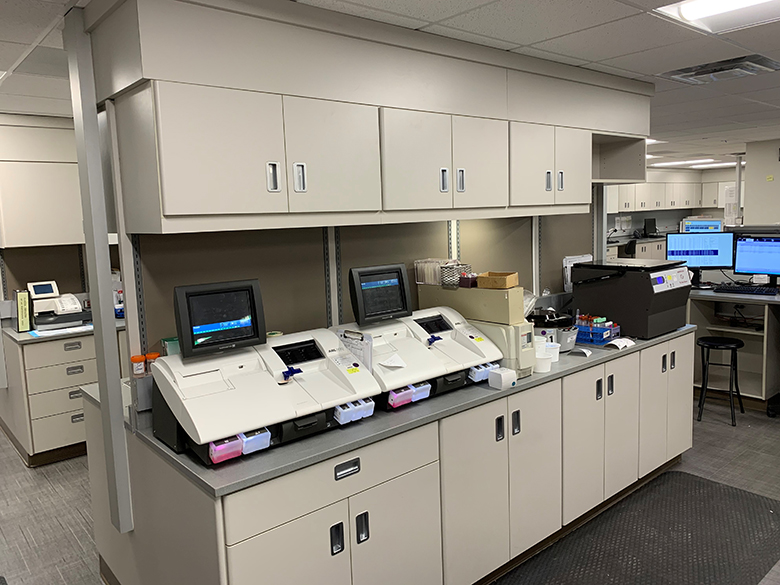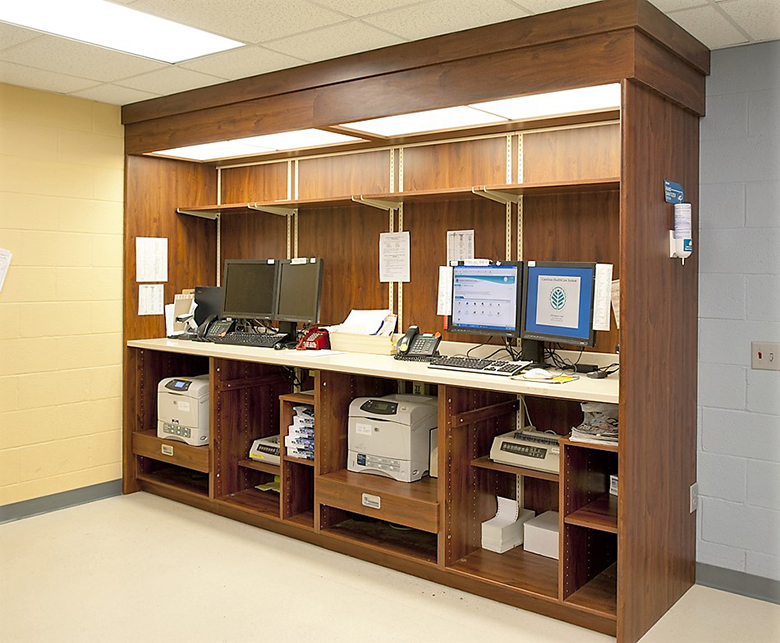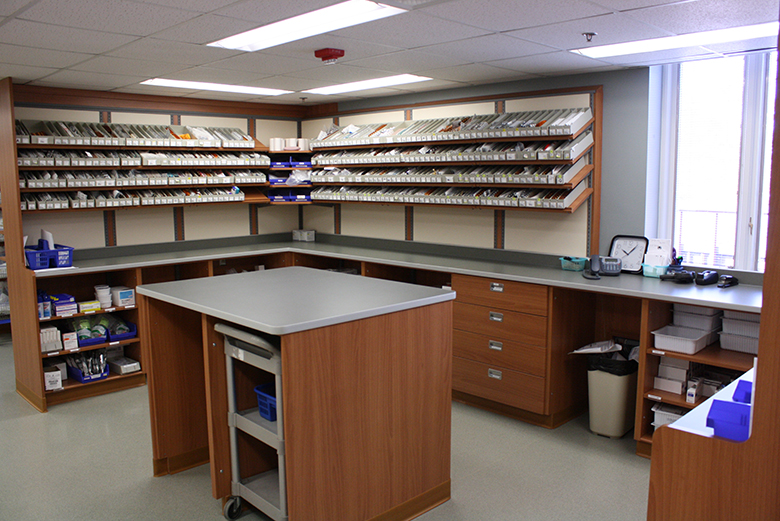What Are the Latest Trends in Modular Casework for Healthcare?

In fast-paced healthcare environments, where organization, safety, and efficiency are paramount, custom modular casework plays a critical role in maintaining streamlined operations.
From outpatient clinics to hospital pharmacies, sterile processing departments to dental labs, every square foot of space must be thoughtfully designed for speed, compliance, and workflow. That’s where modular casework comes in.
Unlike traditional millwork, modular casework offers a pre-engineered, flexible, and customizable approach to cabinetry and storage that evolves alongside your facility’s needs. And today’s designs are more innovative, adaptive, and intelligent than ever before. So, what’s trending in the world of modular casework for healthcare?
From advanced material selection to tech integration and ergonomic functionality, let’s explore how modern modular casework is redefining how healthcare spaces operate — and how R.C. Smith’s tailored solutions deliver long-term value, flexibility, and excellence to your facility.
How Is Modular Casework Evolving in Healthcare?
Modular casework in healthcare is shifting away from cookie-cutter solutions and toward highly specialized, task-specific designs that support lean practices and interdisciplinary workflows. Current evolution trends include:
-
Reconfigurability: Facilities can now reassemble, relocate, or expand their modular casework systems with minimal downtime, especially beneficial in growing outpatient centers or multi-use clinical spaces.
-
Integration with Technology: From built-in cable management to smart storage with inventory tracking, modern modular designs support the digital infrastructure of today’s medical environments.
-
Precision-Fit Solutions: Casework is now often tailored to fit around specific medical equipment or workstations, eliminating wasted space and improving task efficiency.
These features not only help reduce clutter but also create better patient-care environments by improving the flow and speed of tasks for staff.

What Design Trends Address Modern Healthcare Needs?
Today’s healthcare professionals need smarter workspaces. Modern modular casework trends are focusing on ease of access, infection prevention, and ergonomic design, all without sacrificing durability or style.
Some of the more notable design trends include:
-
Hands-Free and Antimicrobial Finishes: Touchless drawers and doors combined with antimicrobial surfaces reduce cross-contamination risk and support infection control efforts.
-
Color-Coded Zones: Designers are using color strategically to define different zones for sterilization, medication prep, or specimen collection — enhancing workflow clarity.
-
Ergonomic Access: Modular units are being designed with adjustable heights, soft-close mechanisms, and mobile workstations to reduce staff fatigue and injury risks.
These elements are essential in today’s post-pandemic healthcare landscape, where safety and efficiency go hand in hand.
How Does R.C. Smith Adapt to Changes in Healthcare Design?
At R.C. Smith, we don’t just follow trends — we shape them. Our team of expert designers and engineers collaborates with healthcare professionals across the country to develop innovative, long-lasting casework systems tailored to their exact needs.
Here’s how R.C. Smith stands apart:
-
Customized configurations for every department, from pharmacy to exam rooms to sterile processing.
-
In-house design + manufacturing ensures accuracy, quality control, and shorter lead times.
-
Modular systems that evolve with your facility — whether you're remodeling, expanding, or adapting to new protocols.

Our commitment to continuous innovation means we’re always looking ahead — developing smarter layouts, incorporating emerging materials, and building to exact industry specifications.
What Innovations Improve Healthcare Facility Organization?
In healthcare, clutter isn’t just inconvenient — it’s a hazard. That’s why new modular casework solutions are being engineered with smarter organizational features that help teams locate, store, and access tools with maximum efficiency.
Trending innovations include:
-
Built-in labeling systems for faster identification of supplies.
-
Drawer inserts and tray dividers tailored to medical instruments or pharmaceuticals.
-
Mobile casework units that can be wheeled between departments based on need.
-
Vertical storage solutions that make better use of tight footprints.
These intelligent systems eliminate guesswork, reduce waste, and ensure compliance — keeping your staff focused on what matters most: patient care.
How Are Materials in Casework Changing with New Trends?
Durability, infection resistance, and visual appeal are driving new material choices in modular casework systems for healthcare. Current material trends include:
-
Thermofoil and Powder-Coated Steel: These finishes resist chipping, staining, and microbial growth while offering a sleek, modern appearance.
-
High-Pressure Laminates (HPL): Ideal for high-use environments, HPL delivers style and strength in equal measure.
-
Eco-Conscious Materials: Recyclable and low-VOC materials are becoming more common as healthcare institutions adopt greener building practices.
At R.C. Smith, we help facilities balance aesthetics with hygiene and longevity — ensuring that every material we select performs in even the most demanding environments.

Install the Latest in Casework Design in Your Healthcare Facility
Whether you’re remodeling a medical lab, outfitting a new hospital wing, or simply trying to improve the efficiency of your current space, R.C. Smith offers industry-leading modular casework solutions that check every box: functional, durable, adaptable, and smartly designed.
From design to fabrication to installation, we manage every step with precision and care, offering a truly customized experience built around your facility’s needs. Let’s design a better workflow — together.
Contact R.C. Smith today to learn how our healthcare casework systems can enhance your facility’s efficiency, flexibility, and future-readiness.